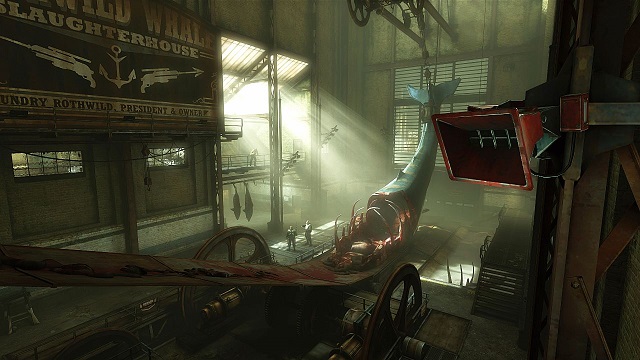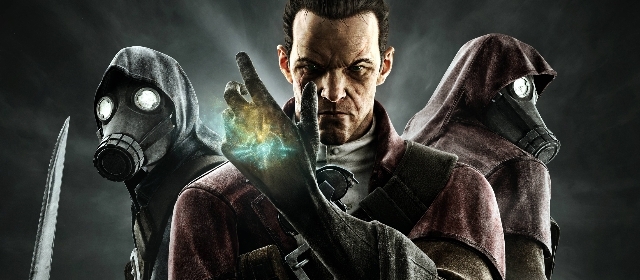Dishonored’s campaign was a tale of woe, betrayal and triumph – depending on how you played, of course. With such a story-driven experience, it was understandable why some were bemused at the game’s first DLC pack: The Dunwall City Trials. It was a fine add-on, but didn’t retain any of the lore from the main game and left players wanting more Dishonored, in the traditional sense.
With The Knife of Dunwall, Arkane Studios have condensed those 12 or so hours you spent blinking, possessing and bending time into what is a substantial and overall gratifying chunk of gameplay.
Running parallel with Corvo’s tale, this time around players assume the role of Daud – the leader of a group of assassins known as The Whalers. The story begins as he and his merry band of mysterious gas-mask wearing comrades are approaching the Empress and her daughter; Lady Emily, and we all know that didn’t turn out too well for them. As a bite-sized chunk of storytelling, The Knife of Dunwall does a decent job of establishing the Michael Madsen voiced character, but does feel like it never goes quite far enough. With Corvo lacking a voice-box, the master assassin’s personality is a welcome change of pace.

However, it must be stated that this is part one of a two part story. Later this year, Daud fans will be able to complete his narrative with another add-on, and The Knife of Dunwall suffers a bit because of that. The mercenary teases with regret over his earlier actions, but that arc is never fully explored. A predictable and disappointing ending can add to a bad taste in the player’s mouth, which is a shame, because overall, The Knife of Dunwall is a satisfying prologue. But it’s worth remembering that it is most definitely the overture to what we’ll see later this year.
More aggressive players will be happy to hear that Daud is more forthright than Corvo with his weaponry. There are many similarities between the two, most notably the lack of more stealth based powers and the inclusion of more combative abilities. Possession was a tool that Corvo could use in many interesting ways in Dishonored and its disappearance is definitely felt, as is the exclusion of The Heart. These have been replaced by certain things like a very Assassin’s Creed: Brotherhood-esque move where Daud can call upon one of his many assassin buddies to come to his aid. Blink has also been revamped, allowing players to freeze time whilst remaining still. Another perk of the re-tooled teleportation power is that players can also pause the passage of time in mid-air, making those hard to reach places a little less hard to reach. Blink is still not without its problems though, and can lead to some clumsy navigation.
The Arc Mine and Chokedust are two terrific additions to the series, though. With these additions to your arsenal, a more attacking mindset is difficult to avoid because there’s an incessant want to use them. The latter is effectively a smoke bomb that disorientates adversaries and leaves them ripe for the picking while they battle with their own phlegm and lack of sight, whilst the Arc Mine is one of the more satisfying ways to rid Dunwall of your enemies. Placed on any surface, when one of your foes approaches, an electrical current rises up and obliterates them in one fell swoop.
At the beginning of each mission, the player is presented with a screen where they can spend their acquired coin on upgrades, ammo and a new option: favors. These favors will grant players access to the location of special equipment or information that pertains to that particular mission. Arkane does a good job of not ensuring these are paramount to Daud’s quests, instead they are merely a way of adding another choice to the multitude of ways in which the lead character can achieve his goal.
One issue with The Knife of Dunwall is that it feels like Dunwall. Now, the first area is a nice change of pace as players get to visit a new environment in a slaughterhouse. On top of the aesthetic change, lunatic butchers and confined spaces challenge the player to reassess many of the habits they have developed when playing Dishonored. But, after that, it feels like a trip down memory lane, in many ways – to the point where you even revisit one area from the original game. The city of Dunwall was a world with such a rich history, and the sense of discovery was wonderful, but Arkane fail to recreate that feeling here by stifling imagination with recycled surroundings and scenery that feels familiar.

VERDICT: Even with its focus clearly on those that relish chaos, the numerous paths players can take to eliminate targets are here, allowing the more stealth-minded assassins a chance to play the game the way they want to play. With such fun tools like the Arc Mine and Chokedust at your disposal, it almost feels like you’re missing out if you don’t get your hands dirty, though.
Part one of Daud’s narrative is a good introduction, but definitely doesn’t feel complete on its own merits. It’s a fun ride and feels just like Dishonored, but with this clean slate, I can’t help but feel that Arkane could have tweaked the template a little more.

GOOD. A game that scores 7/10 is worthy of note, but unworthy of fanfare. It does many things well, but only a few of them incredibly well and, despite a handful of good qualities, fresh ideas and solid mechanics, it fails to overwhelm.






